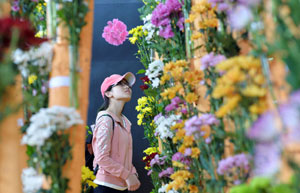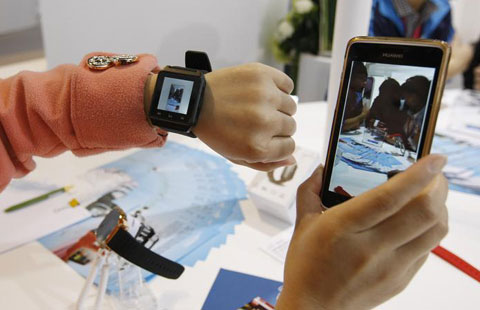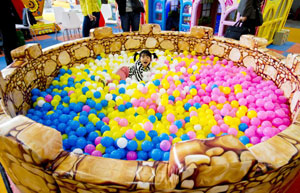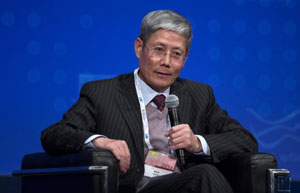A stitch according to the times
By Joseph Catanzaro and Cai Muyuan (China Daily) Updated: 2014-04-28 17:20
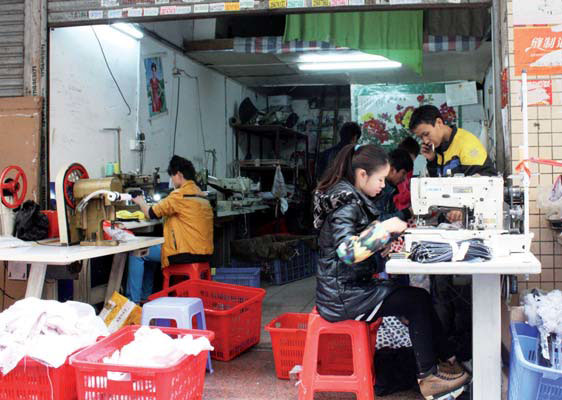 |
|
Workers are busy making garments in Lu's workshop. |
"It's a manufacturing transformation," Lu says. "More and more orders go to Southeast Asia where they work hard and are paid less. Other orders are going to inland China where the price is also lower."
Last year, Lu says he made no profit at all. He now rents this 200 sq m workspace and has a roster of about six employees working the machines.
He concedes the ailing state of his business, and the relatively improved lot for his employees, represent a changing China.
All is not lost, Lu says, because he's changing with it.
Back in China's textile industry heyday, Lu made silk business shirts for American professionals and nightgowns and evening wear for women in Europe.
The textile industry, once the economic fabric of many regions in China, is now fraying.
Lu is stitching his business back together by focusing on making high-end, quality products for domestic buyers. That he's able to do this at all speaks of the rising demand in the Chinese consumer market.
"Each of my workers makes about 200 items per day if it's simple (clothing)," he says. "If it's a harder piece, they maybe only make 10 or 20 items."
Lu is blunt about the nature of the work, but resents the sweatshop stereotype.
"Our workers work long hours," he says. "They are busy and it's hard work. But the situation for workers is better than it was a few years ago. They make more money.
"One reason for that is the law. Back in the 1990s, there wasn't much to protect workers' rights and they got paid less. Also, now more workers know what their rights are. They demand more, and they want benefits."
Lu says the more clothing workers make, the more they get paid. Each worker chooses how many hours they want to put in.
"When business is good and there's lots of work, they can make 10,000 yuan per month," he says. "Some of them don't take lunch or don't take days off. They choose their hours, it's very flexible."
And no one works longer hours at a machine than him.
"I don't have time to have fun," he says. "I start work at 8 am and go until midnight. I go to sleep at 2 am, seven days a week. I never take weekends off."
Lu's wife sells cosmetics. They have settled in Shenzhen, and now consider it home. Their 6-year-old daughter is the joy of Lu's life.
She is the only reason why he breaks his demanding, self-imposed work schedule.
"I never miss my daughter's dance recitals," he says. "I watch every one."
From basic worker to business owner, Lu's progression is a snapshot of the changing lot for many Chinese. Like Zhao, he doesn't want his child to follow him into his profession.
"I don't want that," he says. "I want my girl to go to college, I want her to be a doctor or a teacher. But in the end, I'll support her decision about what she wants to do in life."
At her sewing machine, Zhao says she misses her husband and her little girl. She hopes that she can see them more than twice a year. But right now, she needs to stay in Shenzhen, where she can earn double what she can make back in her home province.
She says what drives her is the same thing motivating all Chinese workers.
"Chinese people do everything for their children, and I'm no exception.
"My parents are farmers. It's tiring work and you can't make much money. My family mostly grows food to eat, not to sell. I want to make more money in the future for my daughter's education. I want the best for her."
Zhou says she doesn't think much about where her cloth creations go, or who will wear them. Neither does Lu.
The clothes they put together might be worn by hip, young professionals, but that's not who they say they are making them for.
They turn back to their sewing machines, piecing together brighter futures for their children, one stitch at a time.
- Migrant worker killed chasing unpaid salary
- More skill training for migrant workers urged
- Migrant workers to share public rental housing
- IBM Guangdong plant hit by strike over workers' severance package
- Chinese migrant workers' wages up 13.9%
- Migrant workers prefer mega-cities: survey
- Workers urge VW to build new model at Hanover plant
- Sohu reports $79 million loss on higher expenses
- It's tough - but rewarding - at the top
- Land of opportunity for farmer's daughter
- Yi Gang joins finance and economic affairs group
- Web security firms pledge to patch XP 'vulnerability'
- 16th Hortiflor Expo opens in Beijing
- Clock ticking for Australia on a "truly great" China FTA
- Migrant who wants to keep moving
